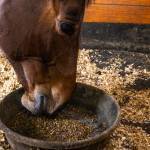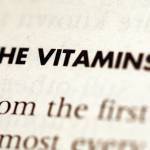Electrolytes and Muscle Function in Horses: Essentially Linked

Electrolytes are critical for many biological functions, including maintenance of hydration status and facilitating normal muscle contraction and relaxation. Electrolytes consist of sodium, chloride, calcium, potassium, and magnesium, and in addition to normal muscle function, these minerals have crucial roles in signaling the kidneys to retain or excrete water.
Electrolytes are taken in via the diet and are lost through sweat, urine, and feces. “A horse’s sweat is hypertonic, meaning it is heavily concentrated with electrolytes, especially sodium, potassium, and chloride,” explained Kathleen Crandell, Ph.D., a Kentucky Equine Research nutritionist. After strenuous exercise or heavy sweating, electrolytes become depleted or imbalanced, resulting in fatigue, dehydration, and muscle cramps.
Profusely sweating horses lose substantial amounts of electrolytes during prolonged exercise, and losses increase as temperature and humidity rise.* Data from Kentucky Equine Research show that horses receiving the drug furosemide, often used to treat exercise-induced pulmonary hemorrhage (EIPH), suffer even greater losses of calcium, chloride, sodium, and phosphorous in the 24 hours following administration and negatively affected the balance of calcium in the body 72 hours later.**
Because electrolytes facilitate normal muscle contraction and relaxation, a disruption of electrolyte balance can disrupt normal muscle function, resulting in cramps. For example, excessive losses of calcium and magnesium can cause the main nerve to the diaphragm to fire in sync with the heart, a condition known as “thumps.” Thumps occurs in extremely dehydrated horses. In addition, significant loss of potassium can contribute to muscle cramps.
Research reported that a properly balanced electrolyte supplement is quickly absorbed from the gastrointestinal tract to replace depleted electrolytes.+ Careful electrolyte supplementation increases the time a horse can perform intense exercise.+ Keeping this scientific evidence in mind, Kentucky Equine Research developed Race Recovery to replace electrolyte losses. Horses supplemented with Race Recovery increased their water intake and body weight losses faster than control horses.
The dose of electrolytes must be carefully considered, as too much can alter acid-base balance and possibly irritate gastric ulcers, among other problems.++ Feeding electrolytes with feed or diluted in water is recommended to reduce the risk of stomach irritation.
Importantly, another study at Kentucky Equine Research concluded that adding dextrose to electrolytes does not increase the rate of electrolyte absorption, suggesting that electrolyte supplements with high dextrose concentrations are likely not suitable for restoring hydration and ion balance.^
Careful planning of electrolyte supplementation, along with a balanced diet, are key factors to help a horse stay in balance and recover from strenuous exercise. Studies have shown that horses given an electrolyte supplement prior to endurance-type exercise drank more water, lost less weight, and maintained higher blood sodium and chloride concentrations compared to unsupplemented horses.^^ By contrast, oversupplementing electrolytes, such as sodium, can also be detrimental to performance. More is not always better. The composition and feeding directions for Restore SR and Race Recovery have been scientifically developed to meet the needs of exercising horses to optimize performance, hydration, and ion balance by keeping mineral ratios in line with the physiological needs of the working horse.
Key overall feeding strategies include providing a horse with plenty of water alongside the regular diet. If exercise is to take place during hot, humid conditions, provide Restore SR or Race Recovery and extra water the night before the event, potentially during the event, and in the days following (according to directions). This type of schedule will help the horse to be well-hydrated prior to, during, and in recovery from exercise.
Hydrated horses in electrolyte balance are much better able to maintain exercise, control body temperature, and perform compared to being in a dehydrated state.
*McCutcheon, J.L., and R.J. Geor. 1996. Sweat fluid and ion losses in horses during training and competition in cool vs. hot ambient conditions: Implications for ion supplementation. Equine Veterinary Journal 28:54-62.
**Pagan, J., B. Waldridge, C. Whitehouse, S. Fuchs, and M. Goff. 2014. Furosemide administration affects mineral excretion in exercised Thoroughbreds. Equine Veterinary Journal. 46(S46):15-20.
+Lindinger, M.I., and G.L. Ecker. 2013. Gastric emptying, intestinal absorption of electrolytes and exercise performance in electrolyte-supplemented horses. Experimental Physiology 98.1:193-206.
++Zeyner, A., K. Romanowski, A. Vernunft, P. Harris, A.-M. Muller, C. Wolf, and E. Kienzle. 2017. Effects of different oral doses of sodium chloride on the basal acid-base and mineral status of exercising horses fed low amounts of hay. PLoS One 12(1):e0168325.
^Pagan, J.D., B.M. Waldridge, and J. Lange. 2103. Dextrose does not affect rate of absorption or retention of electrolytes in idle Thoroughbreds. Journal of Equine Veterinary Science. 33(5):349-350.
^^Düsterdieck, K.F., H.C. Schott, S.W. Eberhart, K.A. Woody, and M. Coenen. 1999. Electrolyte and glycerol supplementation improve water intake by horses performing a simulated 60-km endurance ride. Equine Veterinary Journal Suppl. 30:418-424.








